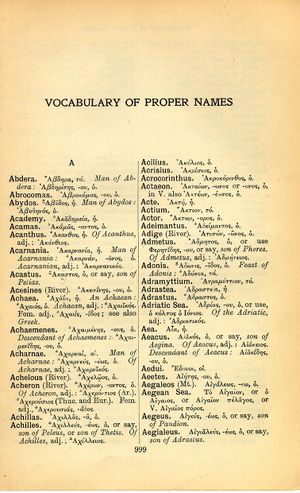Abdera
ὅθεν λοιπὸν ἐπιτευκτικῶς καὶ ἐν τούτῳ ὁ µακάριος πράξας, ἔµεινεν ἀγαλλόµενος τῷ πνεύµατι· καὶ δοξάζων τὸν θεὸν ἐπὶ τῇ µεγαλειότητι αὐτοῦ, ἐν τῷ τόπῳ ἐκείνῳ ἀπελάσας καὶ τὰ ἀκάθαρτα πνεύµατα τὰ ἐκεῖσε ἐπὶ λύµῃ τῆς τῶν ἀνθρώπων σωτηρἰας → Thus, then, the blessed one achieved his aim here, too, and continuing to rejoice in the Spirit, and glorifying God for his greatness, he expelled from this place the impure spirits that lurked there so as to obstruct the salvation of human beings
English > Greek (Woodhouse)
Ἄβδηρα, τά.
Man of Abdera: Ἀβδηρίτης, -ου, ὁ.
Latin > English (Lewis & Short)
Abdēra: ōrum, n., and ae, f., =Ἄβὀηρα.
I Abdera, a town on the southern coast of Thrace, not far from the mouth of the Nestus, noted for the stupidity of its inhabitants. It was the birthplace of the philosophers Protagoras, Democritus, and Anaxarchus; n., Liv. 45, 29, 6; Gell. 5, 3, 3; f., Ov. Ib. 469; Plin. 25, 8, 53, § 94 dub.; 4, 11, 18, § 42: hic Abdera, non tacente me, here was Abdera itself, Cic. Att. 4, 17, 3 (4, 16, 6).—
2 Folly, stupidity, madness, Cic. l. l. (cf.: id est Ἀβὀηριτικόν, i. e. stupid, id. Att. 7, 7, 4, and Arn. 5, p. 164; Juv. 10, 50; Mart. 10, 25, 4).—
B Hence, derivv.
1 Abdērīta and Abdērītes, ae, m., =Ἀβὀηριτς, an Abderite: Democritus Abderites, Laber. ap. Gell. 10, 17: Abderites Protagoras, Cic. N. D. 1, 23, 63; cf. id. Brut. 8: de Protagora Abderita, id. de Or. 3, 32, 128: Abderitae legati, Liv. 43, 4, 8; cf. id. § 12 sq.; Vitr. 7, 5, 6; Just. 15, 2 al.—
2 Ab-dērītānus, a, um, adj., of Abdera, meton. for stupid, foolish: Abderitanae pectora plebis habes, Mart. 10, 25, 4.—
II A city of Hispania Baetlca, on the southern coast, now Adra, Mel. 2, 6, 7; Plin. 3, 1, 3, § 8.

